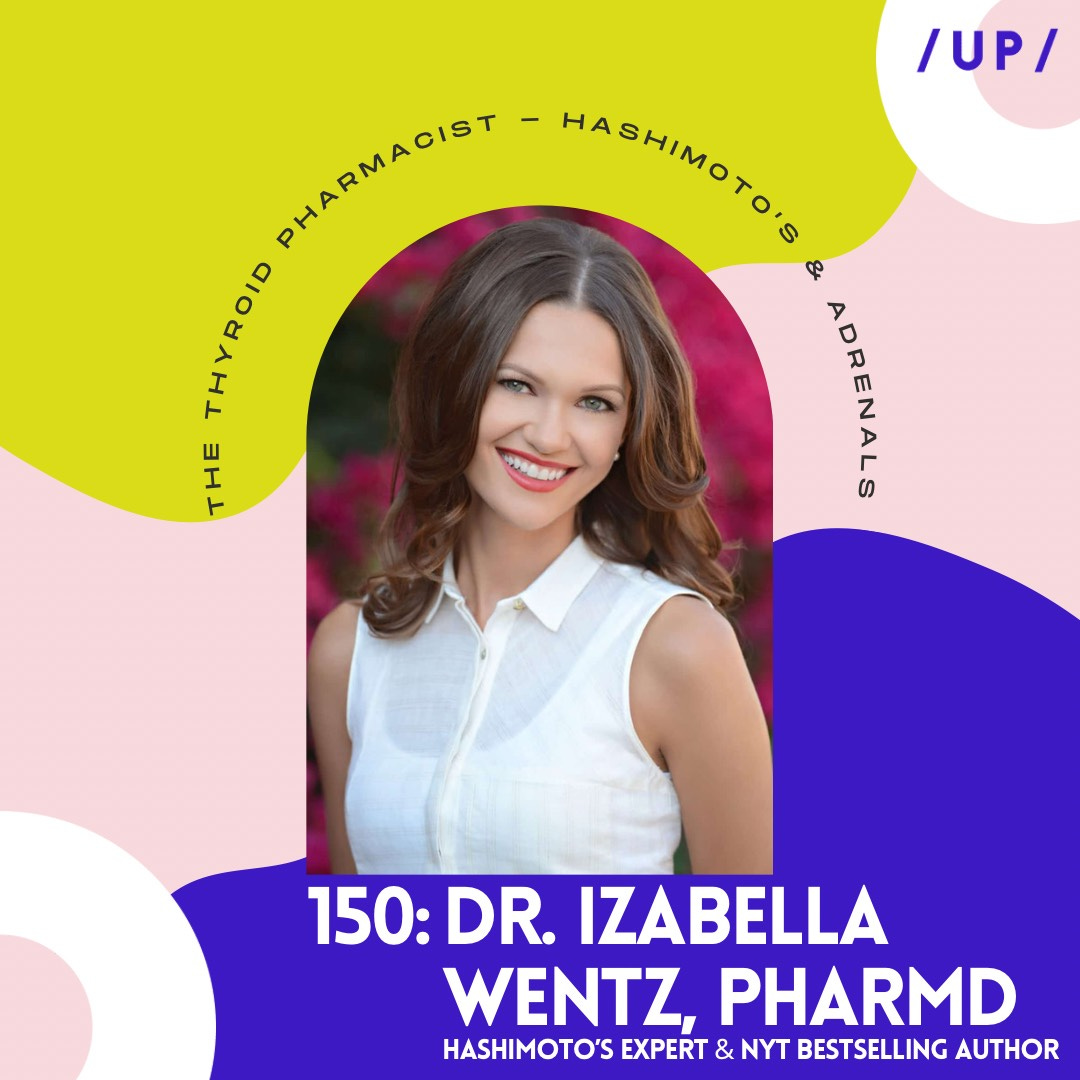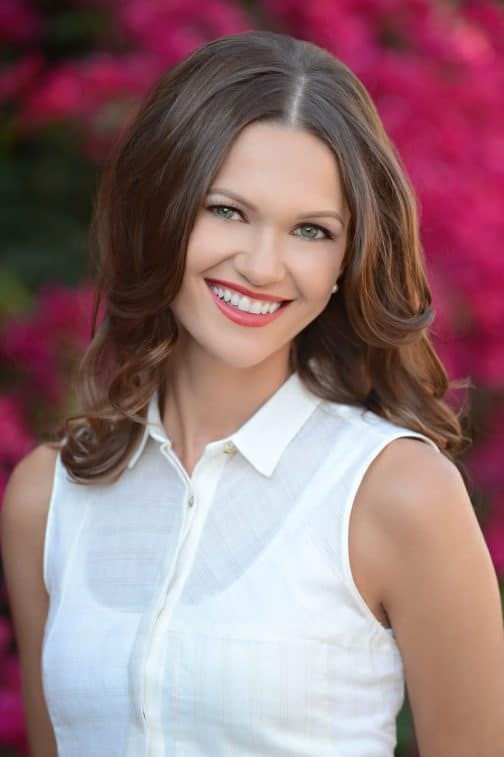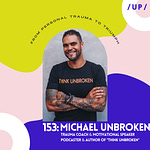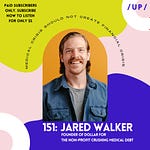Overview
Izabella Wentz, PharmD, FASCP, is an internationally acclaimed thyroid specialist and a licensed pharmacist who has dedicated her career to addressing the root causes of autoimmune thyroid disease after being diagnosed with Hashimoto’s thyroiditis in 2009. She is the author of three books on Hashimoto’s: Hashimoto’s Thyroiditis Lifestyle Interventions for Finding and Treating the Root Cause, Hashimoto’s Food Pharmacology, and Hashimoto’s Protocol, which became a #1 New York Times bestseller. Her latest book, Adrenal Transformation Protocol, was released on April 18th, 2023. The book focuses on resetting the body’s stress response through targeted safety signals and features a 4-week program that has already helped over 3,500 individuals. The program has an impressive success rate, with over 80% of participants improving their brain fog, fatigue, anxiety, irritability, sleep issues, and libido. Dr. Wentz currently lives in Austin and Los Angeles with her husband, Michael, and their son, Dimitry.
Key Links
Takeaway
Tune in as Dr. Wentz shares:
how she became interested in thyroid health
what symptoms she experienced when she was diagnosed with Hashimoto’s
how she applied her pharmacological knowledge to reverse her own Hashimoto’s
how lifestyle changes (especially nutrition shifts) supported her healing
how the concept of adrenal dysfunction became a new focus for her — and allowed her to reverse sleep and anxiety issues
that if you have a thyroid issue, you’re likely also experiencing adrenal dysfunction
what adrenal dysfunction means: that your body is stuck in a chronic stress response
what a cortisol rollercoaster feels like
how ME/CFS and fibromyalgia patients can also experience adrenal dysfunction
why the adrenal response to stress makes sense biologically — even if it doesn’t feel like it’s serving us
where the term “adrenal dysfunction” came from — and why it’s an oh so real biological response, despite the naysayers
why so many people who identify as female live with adrenal dysfunction
why it’s so important to balance our blood sugars and eat more protein in order to begin to treat adrenal dysfunction
the success rates of her Adrenal Transformation Protocol, and how it works
suggestions for supplementation (which should always be reviewed with your MD!)
Sponsors
This episode is sponsored by Gena Chieco Coaching. Get 10% off Executive & Life Coaching using code INVISIBLE! With a background in psychology and law, Gena inspires clients to step into their best lives by helping them access their inner strengths, clear the cobwebs holding them back, and cultivate a dream-big, growth mindset.
Transcript
Lauren: Thank you, everyone, for joining us on this episode of Uninvisible Pod. We are joined by one of my heroes, Dr. Izabella Wentz. She's an internationally acclaimed thyroid specialist and licensed pharmacist, who has dedicated her career to addressing the root causes of autoimmune thyroid disease — after being diagnosed with Hashimoto’s thyroiditis in 2009. She's also the author of four books, including Hashimoto’s Protocol, and her newest release Adrenal Transformation Protocol. Dr. Wentz, thank you so much for joining us on the show.
Dr. Wentz: Thank you so much, Lauren, for having me here. What a joy to be here with you.
Lauren: Yes, total joy! I mentioned to Dr. Wentz before we got into this that I am fangirling hard right now and I know y'all love when I do that! So let's jump into this interview. The first question I have for you, Dr. Wentz, is that you've become known as The Thyroid Pharmacist. In fact, your website is thyroidpharmacist.com, right? So, have you always been interested in thyroid health?
Dr. Wentz: So in full disclosure, I was not interested in thyroid health during pharmacy school. I just thought it was … you know, you have this condition when you get older and you take a pill for it … and that's it.
It wasn't until I got diagnosed myself with Hashimoto’s in my 20s (the most common reason for hypothyroidism in the United States) when I realized that the medications don't really help that much.
And I am a pharmacist. And a big proponent of medications and getting on the right dose for you, and the right type of medication. And I was expecting every single one of my symptoms to go away with the medications. Some symptoms got better. I didn't need to sleep as much; I went from like 12 hours to 11 hours. I wasn't as cold; I didn't need to wear two jackets in Southern California in the summer. I only had to wear one jacket! But then I still had the brain fog, and the fatigue, and the carpal tunnel in both arms, and the allergies and the acid reflux and the IBS and constipation, anxiety, panic attacks. It felt like my body was just breaking itself apart. And I was in my 20s. And this was 15 years ago, and people were telling me, “You’re just tired.” Or, “You’re just getting older.” Or, “Everybody’s stressed.” And, “Of course you’re gaining weight. You’re not a teenager any more. That’s normal, that’s to be expected.” This was very disempowering for me, and very challenging. And I really set out … when I got that diagnosis, I wanted to know what I could do to be the healthiest version with myself, even with Hashimoto’s. I wanted to know if there was anything I could do to prevent the progression to other autoimmune conditions, if there was anything I could do to get my own condition into remission. And that’s how I started my journey. How I became a thyroid expert was really through being my own guinea pig and really through trying to get myself to feel better. Because as you know, having a thyroid issue, we get told so many things … you know, it’s in our head … we just need to put the fork down … we just need to exercise more … It’s so disempowering, and I wanted to, one, empower myself, and then when I got myself into remission, I was, like … I need to get this out into the world. And I stepped out of my public health pharmacist job, which was a big risk, because when you're a pharmacist talking about … there’s more to healing than drugs … it gets to be kind of a big risk. And I'm glad I did it. My first book came out 10 years ago, and I've been able to hear from so many people from around the world that have used my work to heal themselves.
It's just beyond my wildest dreams that my own suffering could turn into such a powerful movement for others to heal themselves.
Lauren: That’s so beautifully said. So your new book, Adrenal Transformation Protocol … this seems like a bit of a departure from your previous work to someone who may not realize that there's actually a big connection between adrenal and thyroid health. So can you talk about that connection a little bit for us?
Dr. Wentz: Yeah, it does seem like a departure. But the truth is, I've been talking about adrenals for the last decade. I talked about adrenals in my first book that was released in 2013, Hashimoto’s: The Root Cause. And they were definitely part of my healing journey. I got into lifestyle changes; gluten-free and dairy-free diets were so helpful for me. Acid reflux, IBS, carpal tunnel … gone, just off of these changes. It was a lot of courage to change my diet. And I'm so glad that I did it, because so many of my symptoms vanished. For people that are struggling with that, it’s like you only have your symptoms to lose. You can always go back to the old way of eating, right? But then I still had the brain fog, fatigue, anxiety. Unrefreshing sleep, even though I was sleeping a ton. And somebody said ‘adrenal fatigue’. And I was, like, okay. And then I looked it up, and being a skeptical pharmacist, it was, like … it doesn't exist. And so I just went on my way, and finally another integrative practitioner mentioned it, and I looked into it, and I was, like, well, I've got all the symptoms, and I'm just going to try it. I'd been trying some crazy things at that time anyway, so I was, like, I might as well try this thing. And wow. The recommendations for adrenal dysfunction worked, and I felt better. Brain fog, fatigue, unrefreshing sleep, trouble waking up in the morning … got so much better. And those anxiety attacks? I used to have panic attacks. I haven't had one in over a decade. And that was balancing my adrenals. People are, like, “How are you so calm all the time? You're like the calmest person. Were you always this calm?” No, I was crazy! I was just so emotionally unbalanced. And a big part of that is getting your adrenals in balance. And I will say, the people that I worked with, with Hashimoto’s, over the last decade … I used to test people for adrenal dysfunction. I was, like, “I wonder if you have this?” I tested so many people that I'm like, okay, if you have a thyroid issue, there's a good chance you're going to have some degree of adrenal dysfunction. You might have overactive cortisol production all day; you might have underactive cortisol production all day. And you might have wrong secretions of cortisol; you might have too much at night, not enough in the morning, or you might be on a cortisol rollercoaster.
At this point, I could talk to you and ask about your symptoms, and I could tell you what your cortisol is going to look like.
And this is what I share in my Adrenal Transformation Protocol book. I have a very detailed assessment people can go through, so they can make that connection for themselves. Because if you have a thyroid issue, you need to work on not just optimizing your thyroid hormones, but also optimizing the health of your adrenals and the hormones that they secrete.
Lauren: You’re mentioning cortisol. So tell us, what exactly is adrenal dysfunction? How does it develop? And how would someone know that they have it? It sounds like you're mentioning a number of symptoms for sure, already.
Dr. Wentz: So adrenal dysfunction is essentially when the body gets stuck in a chronic stress response. Typically, cortisol is produced in a circadian fashion in a healthy person. They'll have a cortisol release in the morning; if you were to picture a slide, you’d be up at the top of that slide, and you'd be going down the slide gradually, like a child at the park. The very end of the day, you would have low levels of cortisol that would allow you to produce melatonin, so you can get restful and refreshing sleep. So the next day, you could wake up bright-eyed and bushy-tailed. On a normal day, when we're not stressed out, and we're healthy individuals, we have good energy, good brain function during the day. This is what a healthy cortisol pattern looks like. We do need some cortisol. Typically, people talk about cortisol being bad. And when we have too much of it, that can be a problem. Cortisol gets released when our body senses stress, when we have too much stress in the body. When we have a traumatic experience, or we're being chased by a bear, or our child gets stuck under a car … we get this cortisol release that puts our body into this fight-or-flight mode. And then we can go and lift that car up, or run away really fast from that bear and climb the tree and get away. Then we kind of shake it off; we sleep it off, or whatever. And then if we're a healthy person, and our stress response is balanced, then we can jump back right into that circadian response where we have a bit more cortisol in the morning, less cortisol throughout the day. Now what happens with the people that I work with, is they get stuck in a chronic stress response. They end up having either too much cortisol all day, and then they get out of bed and they're wired, they're edgy, they're irritable. They feel like they just drank a bunch of coffee. Do you ever pass somebody and tried to say hello, and they’re, like, “No, no, no! I gotta go. I'm busy. I can't talk.” You know, like a lot of people in LA! This is like a high cortisol response. And then in the end, you have a hard time winding down. So you might be the person that needs a glass of wine because you can't fall asleep. Then as time goes on, if you stay in that chronic stress response for too long, cortisol has very catabolic effects in the body. So that means it breaks the body down for fuel. Our body is wise, and it has evolved to help us survive. We're always sending messages to keep things in balance. And eventually, when we have so much stress signaling, the body's cortisol receptors can become desensitized, and our cortisol response can become desensitized. So your brain will say, ‘There's stress,’ and your adrenal glands will say, ‘Oh, that's nice. You want me to produce more cortisol again?’ Nope, not gonna happen, right? They're capable of producing cortisol in the right amounts at the right time of day, their adrenals aren't sick or damaged. But there's this big disconnect between the brain and the adrenal glands. And so as this high cortisol state goes on for too long — we have a lot of stress — the body will start doing some weird things.
So you might be on a cortisol rollercoaster where you wake up tired, and then you have more energy in the afternoon, and then you have a 3pm crash, and then you can't sleep at night because you have a kick of cortisol in the evenings.
You might have a flipped cortisol curve where you're tired all day until the evening comes and you’re, like, I'm ready to go. I'm ready to party! That night owl curve. And then the people that I work with — with hypothyroidism, chronic fatigue syndrome, fibromyalgia, people that tend to be kind of depressed and sluggish — they are going to be the ones that have not enough cortisol secretion throughout the day. So they wake up tired, they're tired at one o'clock, they're tired at two o'clock, they're tired at three o’clock. They’re tired when it’s time to go to bed. And they get to bed, they sleep, and they wake up tired. They have unrefreshing sleep. And these are the people that are, like, “Somebody told me exercise was going to make me feel better. I exercise, I feel worse. Somebody told me that spending time in community was going to make me feel better. I spend time with people, I feel worse." They’re, like, “Fasting is supposed to help with my stress. I fasted, and I feel worse.” And these are people that can barely handle any amounts of stress, even things that we typically would consider positive stressors — like spending time with friends, or doing ambitious things or meeting goals.
Lauren: It’s so interesting, because as you're talking about this, the thing that's coming up for me — so much — is that it sounds as much cultural as it does biological. Is this kind of our body's response to the chronic stress that the world has thrust upon us, in some ways?
Dr. Wentz: I absolutely believe it. I know, especially in the last few years, it tends to be really common for a lot of us. Things like our expectations to always have a side hustle. You're working your day job, and then you have a side hustle after work. When are you replenishing? When are you actually resting? When are you doing things for pleasure, just for pleasure’s sake, without any pressure on yourself. Then there's the expectation of oh, we should all be exercising more. Maybe we have some extra weight … maybe we should eat less. And that can be a stressor on our bodies. Personally I’ve never been big into watching the news. But in the last few years, I was, like, oh, my gosh, what's going on in the world, I need to watch the news. And that can be overwhelming for many of us when things are right in front of our eyes on our TV screens, and they feel like they're right here with us. Maybe there's nothing we can do about it. And we feel so disempowered and stressed-out about what's going on in the world. A lot of things that are part of our modern day life, that fast-paced lifestyle, burning the candle at both ends. This can be extremely physiologically draining. And I'm not even talking about other sources of inflammation and stress in the body; just that kind of modern life alone can put us in that state.
Lauren: You're mentioning this idea of chronic stress. I know that we're talking specifically about those of us who have Hashimoto’s, who are in the club with thyroid disorders. But can you have adrenal issues even if you don't have thyroid issues?
Dr. Wentz: Absolutely. My work started with helping people with Hashimoto’s and hypothyroidism, and I would say most of them have some degree of adrenal dysfunction. And then I started having people reaching out to me that would say, “Hey, I don't have a thyroid issue. I've done every single test. My thyroid is gorgeous. I did the ultrasound and everything. It's just the right shape. It's just the right size. I don't have any thyroid antibodies. But I'm struggling with my weight. I have brain fog, I have anxiety, and I have fatigue. Can you help me?” Okay, so in that case, what happens is people who have this stress response, their body is getting the message that there's a threat, a threat like a famine. What's helpful during a famine? Slowing down our metabolism, right? So that way we don't need as much food and we can just survive on low calories. These are the ladies that are, like, “I'm going to the gym and I'm cutting my calories. Why am I gaining weight?” What happens is that our thyroid gland may be perfectly normal, but the stress perception can cause it to produce more of something known as reverse T3 — to kind of balance out the cortisol response. And reverse T3 will sit on our thyroid receptors, and it will prevent active T3 from getting into those thyroid receptors and activating them, so that we end up with hypothyroid symptoms, even though we don't have a thyroid disorder.
This is very relevant because I meet so many women. Some of them are my clients. Some of them are my friends. And they’re, like, “I have every symptom but I don't have a thyroid issue.” And it goes back to that stress response.
Lauren: That is blowing my mind. I mean, it was blowing my mind when I was reading about it in your book; it's blowing my mind hearing about it again. Because just knowing that it's a very circular relationship that the adrenals and the thyroid have, right. That the adrenal dysfunction can cause the thyroid issues, that thyroid issues can cause the adrenal dysfunction. It's all sort of a vicious cycle if you don't have things in balance. So with that in mind, in the book you mentioned that conventional doctors — and we've sort of touched on this — consider adrenal fatigue a bogus diagnosis. Can you talk a bit more about this, and about the perception of patients like us in the medical system?
Dr. Wentz: It’s just so frustrating to me, honestly Lauren, because I've been talking about this for 10 years. I just posted something on Instagram and I had some random troll saying: This doesn't exist. A woman was asking questions like, “Could ADHD be a symptom of adrenal dysfunction?" And this random person decided to show up and say, "You don't have it.” People are just gaslighting individuals who are struggling, like you and me have, and like so many people that are struggling, and they’re, like, “Oh, this doesn't exist.” It's super frustrating to me. And I'm really hoping to change this conversation and get the message across. Now, where it started … 25 years ago, there was a naturopathic doctor that coined the term ‘adrenal fatigue’, and his theory was that it was a mild version of Addison's. And in some cases, this can be the case. Addison's is a rare autoimmune condition, where 90% of the adrenal glands are destroyed; you're going to end up with not enough ability to produce cortisol. His theory was, like, ‘Well, maybe it's an early stage of it.’ And that certainly can be the case for some people with “adrenal fatigue dysfunction”. But now that we've studied the physiology of it a little bit better in the last decade, 15 years, we understand it's more like a pathway that gets broken. Your adrenals may be perfectly healthy and able to produce the right amounts of stress hormones at the right time of day, but because that communication pathway is broken, because those receptors have been desensitized or overwhelmed … and the brain is still sensing stress, and still sending those stress messages … the adrenals are, like, ‘We're done. No, we're not gonna do any more work. You’ve been stressed for 10 years now, and we're tired of producing cortisol!’ And the people that have these symptoms, they go to a conventionally trained doctor and they'll be told: You can't sleep? Here's a pill for that. You’re depressed or anxious? Here's a pill for that. You can’t wake up in the morning? Here's a pill for that. You’re gaining weight …? And it's kind of like a band aid approach. I'm not against medications; I'm a pharmacist.
Medications can save lives, and the right medication at the right time can be life-changing. But at the same time, there are so many lifestyle things we can do.
And the root cause of all of these symptoms is stress, and our body's stress perception. So, my approach is really focused on sending those safety signals. It's very frustrating for me when people go to the doctor’s … recently, somebody commented on my Facebook: “My doctor said adrenal fatigue isn't real, and even if it was, there’s nothing we can do about it.”
Lauren: So frustrating.
Dr. Wentz: It’s so frustrating and it's so far from the truth.
Your symptoms are real, what you're feeling is real. This is a very predictable way the body responds when it's overwhelmed by stress.
And there's a very predictable way we can get it out of that stress response.
Lauren: With that in mind as well … I mean, I feel like I'm piggybacking off of everything you're saying here … but it's no surprise to me, and I know it's probably no surprise to you, that so many women have thyroid, adrenal and autoimmune issues. But why do you think that is?
Dr. Wentz: Well, I think there are a lot of different pathways that I've explored, from having higher estrogen levels to maybe using more personal care products, and so on. And pregnancy and hormonal shifts. But kind of what I've settled on, is: As women we’re just tuned into stress — and perceptions of stress and our environment — a bit better. From an evolutionary perspective, this makes so much sense. Because for the survival of our species, women have to carry the children. And we have to be selective about when we do so. If you're in a famine, probably not the best for our species’ survival to be pregnant at that time, because that baby's not going to get the nutrients that you need. If we're in a war, probably not the best time either, because to protect yourself you're not going to be able to run as fast if you're carrying a baby. Any kind of subtle messages in our environment, our bodies are always scanning for these. And you don't have to be a mother, you don't have to be of childbearing age; it's just how women are wired. Our hormone receptors, how our brains respond to stress … we have a really unique way of responding to stress that is just more attuned. So we have to be very mindful of how we talk to our bodies, and what messages we allow our bodies to receive. To make sure that we let our bodies know that we're safe.
Lauren: I love that you're talking about that feeling of safety. It's interesting, because I've felt, since I've started learning about all of this science and have gone through my own health issues, that those of us who identify as female are the canaries in the coal mine. That our bodies are sort of the ones going: This isn't working. The way that we're trying to live culturally, it's not working for us. Our bodies are reacting, and this is the signal that we need to change some things. And that there's a lot that we're in control of. But of course, there's a lot we're not in control of, too. In the new book, you talk a lot about helping your body feel safe in order to heal, and how to send safety signals to your body. What exactly do you mean, when you talk about safety signals? Can you talk us through that a little bit?
Dr. Wentz: Absolutely. When we send the body safety signals, we're gonna be focusing on speaking to the body in a language that it understands. So that we're not getting the message that we need to be in fight-or-flight survival mode, we get the message that we're in a thriving state. Part of that is blood sugar balance. So making sure we're eating enough protein and fat — that’s going to be a big game changer. Blood sugar swings are perceived as stress by our bodies; when we have too much sugar, this shoots our blood sugar up, and then we come crashing down. Those crashes, low blood sugar … our cortisol will get released to make more glucose for us from our liver. And so this is a big, big foundation of the protocol. We’re eating more protein, we're eating more fat to balance the blood sugar, and these macronutrients also will help us with repairing the body. Protein is super important for repairing our body; it gets broken down into amino acids, which are the building blocks for our body. And when we're in this fight-or-flight state, this is a catabolic state on the body — which means the body gets broken down for fuel. And so we need more protein to help build the body up. When we're in stress danger perception, our mitochondria are also going to be affected. Mitochondria are these little tiny organelles (sub-cells) that live inside of our cells, that produce our energy. They take fatty acids, and so we're going to be utilizing more good fats, and then convert those fatty acids into ATP, which is an energy molecule for our body. Our adrenal transmission protocol, that's ATP for short. So part of the plan is really focusing on supporting our stress response, supporting our mitochondria. And then we're also working on a lot of transformational work. Sometimes the stress comes from our diet, sometimes the stress comes from our modern lifestyle. Sometimes it comes from unresolved trauma; sometimes it comes from infections, or things within our digestive tract, or food sensitivities. But sometimes it comes right from our heads. If we're not talking to ourselves, and not treating ourselves with kindness … if we have this constant tape in our heads, where we're beating ourselves up and are very critical of ourselves … this can shift us very quickly into that stress response.
And so one big part of my program is focusing on: what are we doing in our lives right now that's making our body feel a threat.
And we do that across all avenues. So your body, your lifestyle, your mind. And we transform how you perceive stress, how your body perceives stress, so that you feel calm and relaxed, and you release good amounts of cortisol throughout the day — good amounts of energy throughout the day — and then you can sleep and get refreshed at nighttime.
Lauren: I love that you're taking this multifaceted approach to healing as well. That it's as much about brain rewiring in many senses as it is about looking at diet and lifestyle. And we know that probably many women in this country, at least, aren't eating enough protein. Right? So focusing on the protein and the healthy fats is really the way to go for any kind of health, from what I understand. I'm curious about the results that people have seen with your protocol. How long does it take to see benefits, and how many people have gone through the program at this point.
Dr. Wentz: I've released the program to over 3,500 people in the last few years. I actually launched it in 2020, as a small group program to people within my community. And I was just amazed with the results that I got throughout the program. 92% of people were able to lessen or eliminate their brain fog. We had anywhere from 80 to 89% improvement in fatigue, irritability, anxiety, trouble sleeping. About 80% of women who wanted to get to a healthier weight were able to do so — anywhere from 5, 10 to 20 pounds within the course of four to six weeks. People realized they were able to even lose weight while exercising less and eating more, by really focusing on this transformational work. The beauty of it is that it doesn't take forever to work. Generally, people that I've had throughout the program — we would meet every week — and the first week they were, like, “I'm so anxious. I'm so overwhelmed. I don't know how I can do this.” Usually by week 3, most of them would say, “I'm feeling really great. I have more energy, my libido has come back. I don't have pain in my body, my brain’s working again." We can start seeing shifts right around the first week with the nutritional changes. When you get your blood sugar in balance, holy cow, what happens for some people … it’s, like, “I don't have anxiety anymore.”
Blood sugar swings can drive up Hashimoto’s antibodies that can drive up that cortisol rollercoaster response.
For me personally, when I first went gluten-free, I went on a gluten-free junk food diet. I didn't realize that all these grains and processed foods were causing me to have blood sugar swings. Once I switched over to a more blood sugar-balanced adrenal diet, I was, like, ‘Oh, I am so much calmer,’ and my thyroid antibodies weren't as high. So this is something that takes effect within a few days. Another thing I recommend is getting replenished from the commonly depleted nutrients — B vitamins, vitamin C, magnesium and electrolytes. People can see results within just a few days of doing those as well. My favorite way to get magnesium into the body is through Epsom salts. People will say, ‘Oh, my gosh, I'm doing this and I'm sleeping so much better. I wake up more refreshed. My anxiety improves, my sleep improves, I have less pain in my body.’ And then I utilize mitochondrial support, including carnitine, and that I feel can have a really great effect on brain function, and also on pain in the body and muscle strength. Generally, my rule of thumb is three to five days to see the results from an intervention. I kind of break down the program where you can start the diet and maybe give that a few days to work. And then you can layer on additional interventions, because it's hard to start off everything at once. If you did everything at once, it would probably be too much to try to incorporate lifestyle change. But generally, you're going to see the effects of an intervention within three to five days. That's kind of a rule of thumb for me that I've noticed in the last decade; when I know something's going to be a needle-mover for people is if they see a quick turnaround. But for the full effects of the program, three to four weeks is when we get these beautiful transformational stories. I have a lot of stories in the book, but I could only fit in a small percentage of people that have had such incredible results.
Lauren: It’s so exciting. You talk about remission, both with adrenal dysfunction and thyroid dysfunction. And especially where thyroid autoimmune issues are concerned. I think it's pretty clear that you believe in remission. But do you think that those of us with autoimmune issues are resigned to taking medications for the rest of our lives? What does that picture look like for you?
Dr. Wentz: I wasn't sure if it would be possible for people to come off medications, when I first started about 10 years ago. And in the last few years, I think so much innovation has come out. And I've learned so much … where I have had people, clients or individuals that I've worked with, as well as people I've never met, that just followed some of my work and read my books … that have been able to come off medications. Obviously, it's much easier to prevent the need for medications if you can catch Hashimoto’s in an early stage. We can have an attack against our thyroid gland for 10 years before we require medications, but before our thyroid gland can no longer produce enough thyroid hormone. But there are things like myo-inositol, which I include in the Adrenal Transformation Program that have been recently gaining attention in the literature for normalizing TSH levels — and that means normalizing thyroid function — especially in the early stages of hypothyroidism. It's one of the things that I have noticed in my program, where women will be able to lower their dosage of medication utilizing this, and I’m, like, “Make sure you test your thyroid function if you're doing any of my programs. Work with your doctor, test your antibodies, test your TSH free T3 free T4. I do not want you to get over-medicated. Because you may no longer need as high a dose of medication. Or you may be able to come off the medication.” It's not every single person, but I have seen those benefits. Then there's low level laser therapy over the thyroid gland that has been shown to help people reduce the need for medication. Also, things like a low iodine diet and aloe are different strategies out there that can help people come off thyroid meds, or perhaps prevent the need for thyroid meds. Again, if you have had your thyroid gland removed, maybe that's not realistic at this point. I'm always looking out for the latest technology. There is a company that is growing thyroid glands in a lab. So I definitely keep everybody posted on my newsletter and on my socials, for any kind of innovative things that are coming out into the world with thyroid health. But thanks for asking that question. It’s always exciting, and why I didn't stop at writing three books, because I'm always learning so many new things. My latest book has a lot of innovative things I didn't know about five years ago.
Lauren: And so exciting, as you say. that so many of these innovations are coming out and that we're alive to witness them! I’m wondering, as we begin to wrap up, if you could crystallize all your experience down to your Top Three Tips — perhaps for someone who's living with invisible chronic illness or some kind of disability, perhaps based around thyroid, adrenal — what would you offer to someone who's entering this world that we've been a part of?
Dr. Wentz: Oh, man, I would say, listen to your body and trust your intuition and trust your signals.
Please do not let somebody tell you that it's all in your head and gaslight you from knowing your own body.
Because you're the one that lives in your body, you know your body best. Try to educate yourself as much as possible. Listen to podcasts about the topic, read blogs, read books, and educate yourself with this information so you can be empowered and take charge of your own health. A lot of times the answers are not found at the corner drugstore, they're not found at your local doctor's office. You may need to look a little bit deeper. But believe that you are worth it, believe that you are worthy of healing and believe that you can. Because part of that mindset is what's going to help you feel better and get better. It is something that is not accessible to everybody. And this is why you and I do the work that we do to try to spread the message about all the different pathways to healing.
Lauren: Beautiful. It couldn't be said better. And what is your ask for our listeners today? What can they do to support you and your community in your ongoing work?
Dr. Wentz: Well, I would love for listeners to help me put adrenal dysfunction on the map, and to help support the message getting out. So if you're listening to this podcast, please share it with anybody that you know that you think might benefit, or just because! If you have issues with adrenal dysfunction, or perhaps you know somebody that does, please consider buying my new book, Adrenal Transformation Protocol. This can be really life-changing for people to be able to shed those stress symptoms and uncover the real person underneath. If you've enjoyed this podcast, please review it. If you enjoyed my book, please review that. It just really does help us spread the word. A lot of us are doing this. It's very unconventional to talk about these things, and we are putting ourselves out there. So we always appreciate any kind of feedback, sharing of our work, and support of our work.
Lauren: And how can listeners find you and your work if they want to learn more about the Adrenal Transformation Protocol book or any of your work and resources?
Dr. Wentz: All of my books are on Amazon and Barnes and Noble, wherever fine books are sold, so you can definitely check out my books there. My website is ThyroidPharmacist. And I have the ‘ABCs of Adrenal Guide’ at ThyroidPharmacist.com/abc where people can go ahead and download that. And then I'm also on social media. I'm on Instagram and Facebook under Izabella Wentz, PharmD, or you can look for Thyroid Pharmacist as well and that'll get you to me.
Lauren: That is absolutely wonderful. Is there anything else you'd like to share before I release you into the wild?
Dr. Wentz: Thank you so much, Lauren, for having me. It's been such a pleasure connecting with you and everybody listening. I want you to know that just because it's so common to feel exhausted, and have brain fog, and feel edgy and anxious and have trouble sleeping, that doesn't mean it has to be a part of your world. It doesn’t mean you have to feel that way.
You can absolutely feel calm and collected and be full of energy and be able to sleep really well at night, and recover and rebuild your body.
Lauren: Gorgeous. I have that hope for healing for all of us. So, thank you so much, Dr. Izabella Wentz. It has been an absolute pleasure chatting with you today. You're on my list of people for all-time greatest hits, so this is a dream come true for me! Thank you so much.
Dr. Wentz: Thank you so much, Lauren. I so appreciate you having me on.
















Share this post